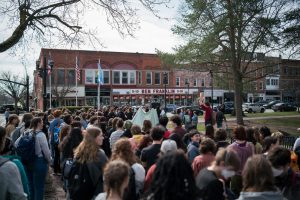Students Promote Inclusivitity in Math, Sciences
February 27, 2015
This semester students created several new groups aimed at providing safe spaces for women, non-binary individuals and minorities navigating certain departments that have been traditionally white and male-dominated, such as math, computer science, philosophy and the natural sciences. Three new groups, Women in Economics, Women in Math and Computer Science and Oberlin Feminist Philosophers, held their first meetings in the early weeks of this semester.
Rudy Boyd, College junior, computer science major and co-chair of WOMACS, said she found many of her courses to be isolating and unnecessarily competitive environments. She hopes that WOMACS will be a source of encouragement for women in a less-than-welcoming atmosphere.
“Our primary focus is to provide a community for Oberlin women in computer science or math,” Boyd said. “I think it can be very alienating to be in a classroom full of men or people you don’t identify with — just to feel like the only woman. I think that often leads to women not participating and not being an active part of the classroom. … I think it’s really important that women have a place where they can come talk about their issues and come talk about how they feel in classes or look for advice on how to deal with conflict.”
This month, College sophomore Ariel Miller also started Oberlin Feminist Philosophers, a group for women and people who have been oppressed by sexism and transphobia. “We started Oberlin Feminist Philosophers to give women a safe space to explore philosophic thought,” said Miller in an email. “Philosophy can be a huge boys’ club — out of all the humanities, it has one of the lowest percentages of women and people of color (both professors and students). We want to show people that we belong in philosophy too.”
Studies have shown that some women and minorities suffer from what’s known as imposter syndrome: the feeling that one is incapable or inadequate when compared to “authentic” peers, despite concrete evidence to the contrary. One of the factors that might contribute to this phenomenon occurring in the math and sciences is the lack of representation of minorities, women and non-binary individuals in those fields, leaving students without many success stories to emulate. Without those examples, some find it more difficult to envision themselves as productive and contributing members of those fields.
College senior Gabriel Moore co-founded the Black Scientists Guild last semester with the aim to combat feelings of imposter syndrome.
“These spaces are needed to show, ‘Look, people before you have done this, done it successfully and are still doing it and you can too,’” said Moore. “So I think these spaces are needed more for younger people to push them into the higher levels.”
WOMACS and Women in Economics similarly intend to tackle underrepresentation. Mimi Stern, College junior, history and economics major and co-founder of Women in Economics, said that she and fellow female students wanted to create a space where junior and senior women in the department could connect with younger female students.
“Ever since we were first-years, we always wished we had more visibility of upper-class women or upper-class non-men in the department, more gender representation on the faculty [and] just a better community in general,” Stern said.
Stern said that as a junior, she now sees a closer community as the solution to underrepresentation. She believes that by validating students’ feelings, these safe spaces will provide a nurturing atmosphere within a competitive department.
“The goals aren’t major and lifechanging,” she said. “They’re like, expanding opportunities and networking, meeting other people. We’re not asking for a lot; we’re asking for very little, actually. I think the avenue we’re going is having more of a community network, and having more of a sense of ownership over the department, over the material and over our role. When you sit in a class and you’re one of four women and there are thirty people in the classroom, you feel like you’re out of place; you feel like you’re not supposed to be there.”
The discrepancies in gender and race in math and science can be credited to more than a competitive environment and underrepresentation. According to Moore, there is less conversation about society and socialization in these fields than in humanities departments, due to the detached, fact-based nature of the subjects.
“Scientists, in general, are typically not as conscious as social sciences and humanity students, which I think is a fault in the field itself. … In a science classroom, you don’t need to talk about social impacts of what you’re talking about, and I think that allows scientists to not be conscious of what is happening on campus or groups trying to promote social change. They stay insular in the science bubble.”

























